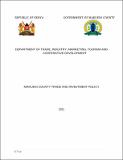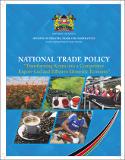Discussion Paper No. 321 of 2023 on Trade Agreements, Standards, and Regulations: Competitiveness Implications for Kenyan Firms Exporting to the European Union
Publication Date
2023Author
Type
KIPPRA Publicationsviews
downloads
Metadata
Show full item recordBy
Mwatu Shadrack & Karanja, John
Abstract/Overview
The European Union (EU) market is critical for Kenya in achieving the goals of the Kenya National Export Development and Promotion Strategy, especially realization of an export-led growth. Despite the EU market accounting for over 51.3 per cent of Kenya’s untapped export potential, few studies have examined the competitiveness implications of key market access factors such as tariff barriers, technical regulations, and standards on Kenyan firms exporting to the market. Using panel data spanning 2007-2020, the results demonstrate that higher preferential margins emanating from trade agreements are associated with an increase in export competitiveness and the number of products per exporter, but a decline in the number of exporters per product as firms embrace specialization. Larger preferential margins are associated with a rise in number of technical regulations and standards that must be complied with to access the EU market. Higher technical regulations are associated with an increase in export competitiveness, the number of products per exporter, and the number of exporters per product. Since regulations promote fair trade practices and are legally binding, they enhance export competitiveness. Higher number of standards is associated with an increase in export competitiveness, but a decline in the number of products per exporter and the number of exporters per product as firms differentiate and specialize in a few products. On export competitiveness, the results point to a need to strengthen domestic capacity especially among MSMEs to comply with existing technical regulations and standards for enhanced competitiveness. In terms of the number of products per exporter, the findings point to a need for enhanced cooperation in quality management and assurance through capacity building. Regarding the number of exporters per product, the findings indicate that there is a need to build functional ties between institutions from developing countries and those from the EU for enhanced access to information and improved compliance
Subject/Keywords
Trade Agreements; Trade Standards; Trade Regulations; Tariff Barriers; Export Competitiveness
Publisher
The Kenya Institute for Public Policy Research and Analysis (KIPPRA)Series
DP/321/2023;Collections
- Discussion Papers [346]
Related items
Showing items related by title, author, creator and subject.
-
Makueni County Arts, Trade and Investment Policy 2022
County Government of Makueni (County Government of Makueni, 2022)Trade and investment play a significant role in a country’s growth and development through their linkages with all the sectors of the economy by creating markets through which goods and services get to the consumer. Trade ... -
National Trade Policy “Transforming Kenya into a Competitive Export-Led and Efficient Domestic Economy”
Ministry of Industry, Trade and Cooperatives State Department for Trade (Ministry of Industry, Trade and Cooperatives State Department for Trade, 2017)The National Trade Policy of Kenya has been developed to address the changing landscape of governance and trade in the country, including devolution and the need to re-emphasize the role of trade in reducing poverty and ... -
Discussion Paper No. 304 of 2023 on Leveraging the African Continental Free Trade Area to Expand Kenya’s Trade in Africa
Malot, Kenneth (The Kenya Institute for Public Policy Research and Analysis (KIPPRA), 2023)The African Continental Free Trade Area (AfCFTA) has experienced substantial growth, prompting the exploration of the key factors driving this expansion. In response to this dynamic landscape, this study seeks to provide ...




